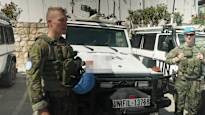DEIR KIFA In southern Lebanon, a group of Finnish peacekeepers practices first aid at their base in Deir Kifa. Two cars have collided and a Finnish patrol has happened upon the scene.
In the exercise, the area is secured and the victims are helped until the local ambulance arrives.
In recent months, South Lebanon has had bigger problems than traffic, however.
Israel and the Iranian-backed Hezbollah movement have been firing at each other across the border since October. Hezbollah said it launched the attacks to show solidarity with the Palestinians in Gaza.
About 200 Finns serve as part of the UN’s UNIFIL forces. In Deir Kifa. there are also French peacekeepers. There is just no guarantee of peace.
Unifil’s mission is, among other things, to monitor the cease-fire established after the 2006 fighting between Israel and Hezbollah and to ensure that weapons other than those belonging to the Lebanese army are not brought into the area.
“There’s quite a war going on here”
In reality, there is no monitored ceasefire and Hezbollah’s weapons are enough.
– In practice, there are constant ceasefire violations. It’s sometimes frustrating, because quite frankly there’s quite a war going on here at the moment, says the commander of the Finnish crisis management force in Lebanon, lieutenant colonel Jukka Honkanen.
Hezbollah has a strong presence throughout southern Lebanon and fires its weapons at Israel from Unifil’s area of operation as well.
Israel, on the other hand, is constantly attacking Lebanon. According to public records In April, Israel also struck the village of Srifa, which is located about three kilometers from the Finnish and French base.
The target was a house possibly belonging to a Hezbollah commander.
However, on the scale of southern Lebanon, the Finns’ base is in a peaceful area.
The Finns do not have their own control area, but they patrol the entire Unifil operating area. This task can take them close to the border or as the UN calls the Blue Line.
An interesting task attracts
At the Deir Kifa base, interviewees other than the commander appear only by their first name for security reasons.
Corporal Luck has renewed his washing and served here also before the situation started to tighten last October. Change makes the task interesting.
– This is really different compared to previous operations. We patrol in heavy protective gear and closer to the Blue Line. All kinds of things happen.
A sergeant who arrived a couple of months ago Kalle tells about a situation where Finns were fired upon.
– We were on patrol and we drove on the road near the Blue Line. A bang started to sound and we left. Yes, it was felt quite clearly in the cabin of the car as well.
Lieutenant Colonel Honkanen says that the patrol can get into an area where a firefight starts, even if the UN is not the target.
– Then the task is to move away and to the nearest UN station. We have checked in advance which stations are closest to the patrol’s route. You have to be alert all the time.
Sergeant Kalle reminds us that at the same time, we also remember positive things from patrolling, such as the friendliness of the locals. For him, being a peacekeeper was a good continuation after the army.
Corporal Onni also says that Finns still try to interact with the local population as much as possible.
One might expect too much from Unfil
Unifil is sometimes met with unrealistic expectations, with some Lebanese hoping it could bring peace to the region.
According to lieutenant colonel Honkanen, the Finns have also encountered signs of dissatisfaction, such as throat-cutting gestures and showing the middle finger.
UNFIL’s mandate comes from the UN Security Council. Observed ceasefire violations are reported forward, but not much else can be done.
– We continue to work and present to the staff that we could be more effective in those areas where there are a lot of firefights. With our own existence, we could perhaps prevent the area from being fired upon, Honkanen reflects.
He reminds that the peacekeepers’ own safety weighs in the other balance, however, and it is not wise to come under fire.
The tense situation can be seen in practice
The situation has changed, says experienced corporal Onni.
– The risk that something could happen has increased. It is possible that unexploded ordnance may be found or that there may be indirect fire in the vicinity.
Lieutenant Colonel Honkanen wants to remind you that there is no feeling of insecurity among Finns.
– Movement is planned in advance. We’re not going anywhere into the wolf’s mouth. I would calm down in the direction of Finland. Things are pretty good here and we feel very protected.
When we leave, a Finnish patrol of three vehicles is leaving the gate.
The departure is preceded by a review of the route and the task. The patrol moves with three armored SUVs. If necessary, the base has a line of heavier armored vehicles, which are admittedly awkward at times on Lebanese roads.
Hezbollah fired dozens of rockets
Hezbollah has clearly accelerated its attacks on Israel in recent days. Dozens of rockets were fired across the border yesterday. The strikes are in retaliation for an Israeli airstrike on Tuesday that killed a high-ranking Hezbollah commander.
If the confrontation between Israel and Hezbollah becomes even more violent, the risks will also increase for the peacekeepers.
However, the threshold to withdraw the UN troops from the area is high, says Lieutenant Colonel Jukka Honkanen.
– We would continue operations as long as possible. If the situation requires it, we would first stop patrolling and stay at the stations here. Plans are being made all the time, but the situation would have to be very radical before the troops are removed from the area.
